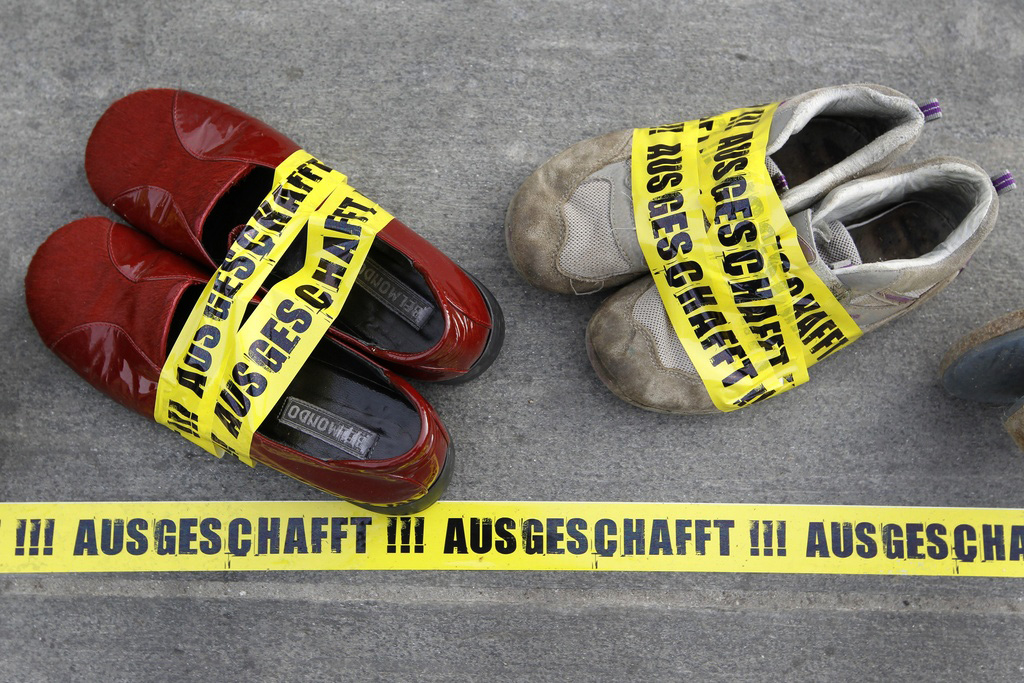
Left rallies to defy anti-crime policy

Opponents of proposals to deport foreign criminals are struggling less than three weeks ahead of a nationwide vote on November 28.
Leftwing groups staged street events in cities and towns across the country over the weekend as a senior Green Party politician challenged the figurehead of the rightwing Swiss People’s Party at a podium in Zurich.
So far, supporters of a rightwing initiative to automatically deport foreign criminals clearly have the upper hand in the battle for public attention. Their controversial “black sheep” posters have reappeared on billboards and emotions dominate the public debate at party meetings across the country and in the media.
This is largely a reflection of the unequal financial resources at the disposal for supporters and opponents of the initiative, says Georg Lutz, a political scientist at Lausanne University.
But the left has stepped up efforts to gain attention, partly with a series of local events by artists and street performers, although the impact could be very limited, according to Michael Hermann of Zurich University.
“I doubt whether these creative happenings reach people beyond those who are already convinced of the cause,” he told swissinfo.ch.
Hermann added that public addresses by new Justice Minister Simonetta Sommaruga, from the centre-left Social Democrats, had a bigger potential to scupper the chances of the People’s Party.
It is an open question for him whether the centre-left alliance of Social Democrats, Greens, churches and trade unions would necessarily be more successful if more funds were available.
“The general mood is too obvious. Citizens want tougher laws against criminal foreigners, it appears,” he said.
Divisions
The centre-left is hampered not only by financial restrictions. It is in the tricky position of trying to reconcile the rejection of the rightwing proposal but also tolerating – without actively promoting – support for a similar counter-proposal by parliament and the government.
The alternative option aims to crack down on foreign criminals but in line with international law and constitutional rights and it seeks to encourage integration projects.
Both Lutz and Hermann agree that the apparent split within the Social Democrats – a pragmatic minority are in favour of the counter-proposal beside a majority of uncompromising opponents of a legal reform – will not necessarily backfire.
“The row helped raise public awareness and drew media attention,” Lutz said.
Tactics and progress
It has helped to show that the issue is not black and white – for and against the initiative. However, it is not easy to get across the tactical reasons in favour of the counter-proposals, he added.
For his part, Hermann considers the discussions within the Social Democrats over foreign criminals and the fact that different positions are accepted unambiguously as “progress” since such issues were to a certain extent a taboo.
The Social Democrats leadership and Sommaruga – a representative of the moderate wing – tried to smooth out the different positions following a stormy party congress ten days ago.
They stressed both wings were united in their rejection of the hard-line initiative and that opinions only differed on how to achieve the aim.
However, experts have cautioned against practical consequences if the centre-left scatters its vote.
Economy
Supporters of the counter-proposal among the Social Democrats are unfazed by such warnings. They try to blame the centre-right parties for failing to live up to pledges made about taking a leading role in campaigning in return for support in parliamentary discussions.
In apparent agreement but without directly referring to the criticism, a small group of centre-right politicians and party officials publicly slammed the conspicuous lack of support by the business community in the campaign over the past weeks.
In a similar vein Justice Minister Sommaruga repeatedly called on the Swiss Business Federation to open up its coffers and contribute to the campaign to ward off potential damage to the economy.
But to no avail: the pressure group steadfastly dismisses all appeals.
The vote on the People’s Party initiative is not significant for the economy, the federation’s director is quoted as saying.
Voters have the final say on November 28 on the initiative of the rightwing Swiss People Party and an alternative proposal by parliament.
The initiative calls for the automatic deportation of foreigners convicted of crimes such as murder, rape, other serious sexual offences, violence such as armed robbery, drug trafficking, human trafficking, and breaking and entering. Welfare fraud is also included.
The parliamentary counter-proposal is a compromise and calls for the deportation of criminals but it insists on case-by-case examination in line with international law and the Swiss constitution. It also includes measures to boost integration.
The political parties are split: the centre-right backs the counter-proposal, the rightwing campaigns for the initiative.
The centre-left calls on voters to reject both proposals saying existing laws are sufficient. However, a minority supports the counter-proposal.
The showdown last Saturday pitted the People’s Party figurehead Christoph Blocher against Daniel Vischer of the Green Party.
The debate attracted about 1,000 spectators, mostly People’s Party supporters, and was one of two major public discussions organised by the rightwing party.
Observers say the event was marked by a combative rhetoric of the panellists and contemptuous comments against political opponents by members of the audience.
(with input from Etienne Strebel)

In compliance with the JTI standards
More: SWI swissinfo.ch certified by the Journalism Trust Initiative





























You can find an overview of ongoing debates with our journalists here . Please join us!
If you want to start a conversation about a topic raised in this article or want to report factual errors, email us at english@swissinfo.ch.